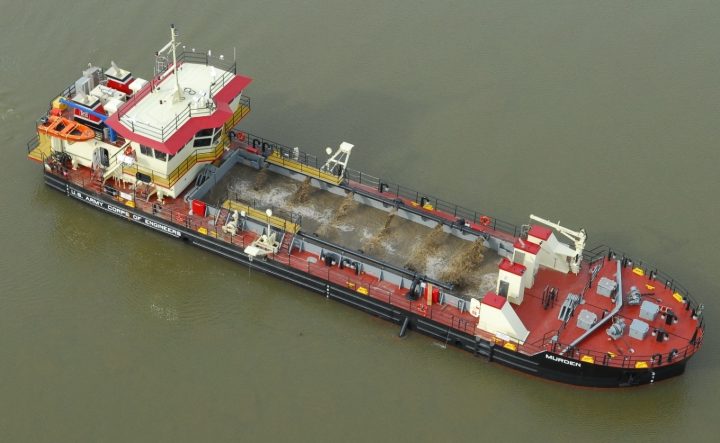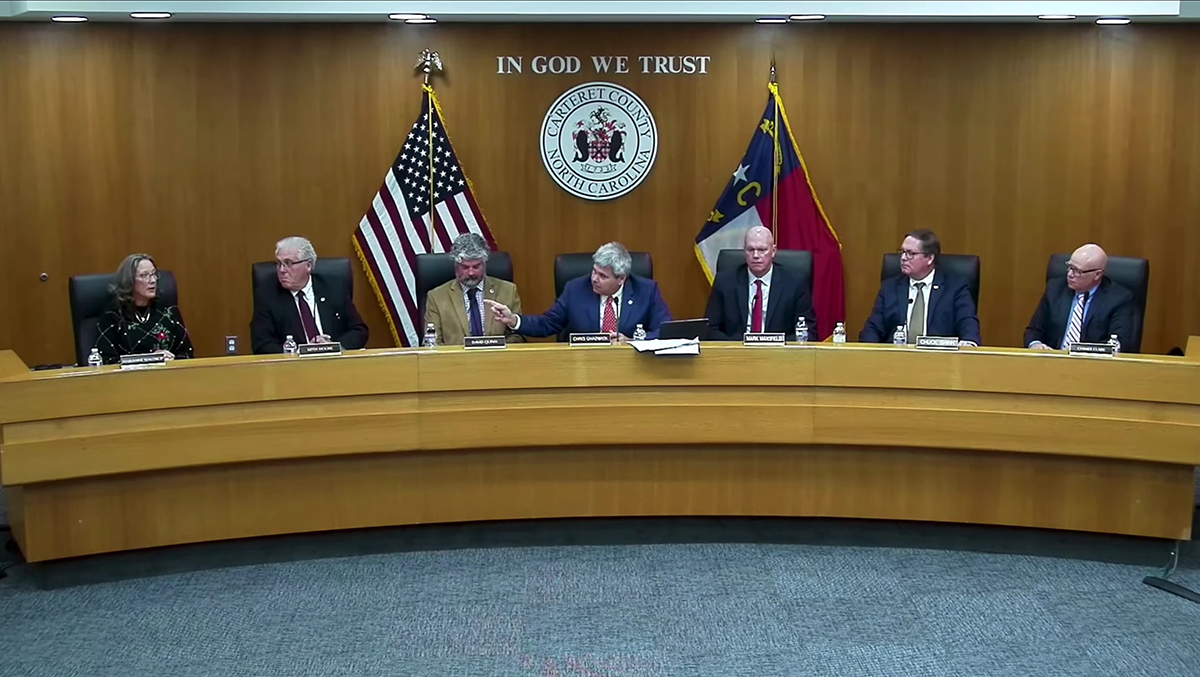
MANTEO – A hastily called meeting last week of the Oregon Inlet Task Force was intended to nail down details of a work plan for a proposed Dare County-based dredge and the forgivable loan to a private partner. But progress on the panel’s ambitious plan hit some headwinds.
Notably terse and testy, the special meeting Jan. 29 at the county administration building in Manteo succeeded in highlighting more questions about the dredge than answers, including the selection of the contractor, EJE Dredging Service, LLC. The Greenville-based company, which has never done major dredging, was formed on Aug. 17, 2018, weeks after the task force chose it over Quincy, Massachusetts-based Cashman Dredging, which has extensive experience with large projects off the Atlantic, Gulf and Caribbean coasts.
Supporter Spotlight
After Browny Douglas, an alternate member on the seven-member task force, a Dare County panel that addresses inlet matters, asked to “put some names” with the chosen contractor, Chairman Jim Tobin informed him that the firm is owned by Judson Whitehurst, who also owns EJE Recycling, a long-established disposal business in Greenville.

“It doesn’t ring a bell to me,” Douglas responded, “But it seems like – Pitt County – some bells should be ringing.”
The task force has been anxious to move forward on design and construction of a split-hull, or hopper, dredge that would be moored at Wanchese harbor, a plan engendered by legislation passed last year that appropriated $15 million from the state’s shallow draft inlet dredging fund. The law requires the contractor to pay $15 million of the $30 million dredge, and work at a reduced rate for Dare County for at least 10 years in exchange for a state loan being forgiven.
Under the legislation, the ocean-certified dredge, which must be completed in 24 months, would be used mostly in maintaining Oregon Inlet, although it would also be expected to be put to use in Hatteras Inlet and other state waterways.
“One thing I would say about it,” Tobin said at the meeting. “We’ve been working on this since September. It’s been a work in progress. It’s also something that complies with state law.”
Supporter Spotlight

As Tobin explained, the task force and EJE want Jensen Maritime Consultants to design the vessel. Jensen had designed the 156-foot Murden, an Army Corps of Engineers hopper dredge similar to what the task force wants. A hopper dredge fills its hold with dredged material to deposit at a set location, rather than pumping it through a pipe or casting it to the side. It is unclear if a Murden-sized dredge could be modified to also maintain some smaller waterways in the county, or even to build spoils islands.
“What will happen is once the design is finalized, they’ll put out RFPs to all the shipyards,” Tobin said, referring to request for proposals to build the dredge. But Tobin’s motion to approve Jensen, along with plans to review and approve an architectural proposal and promissory note, fizzled.
After some tart back-and-forth exchanges with member Harry Schiffman, Tobin abruptly left the room to fetch County Attorney Bobby Outten to explain a seeming discrepancy about whether it was premature to vote on the architect.
Responding, Outten advised the task force to let Jensen know that there was interest in starting negotiations.

“You can’t approve the contract,” he said, “because there’s nothing to approve yet.”
Equally murky was a discussion about setting “usual and customary” rates for dredging, based on the Corps’ rates, although it was not stated whether the Corps used updated rates. Proposed rates in the forgivable loan agreement ranged from $14.33 per cubic yard to $23.31 per cubic yard, depending on where it was loaded – inside or outside the bar – and whether it was dumped at Pea Island or at the bar, referring to the large shoal in the ocean at the entrance to inlet. And no one seemed to know what the rate might be at Hatteras Inlet.
“There’s a lot of guesswork here,” Schiffman said.
But Tobin said the document was not the final draft.

An explanation for the discounted rate – proposed at a minimum of $1.50 per cubic yard less than the base rate – was not provided. Whatever the rates end up to be, Tobin said, they will be reviewed every year and adjusted to mirror percentages in fluctuation of the Corps’ daily rate.
According to minutes from the task force meeting in August 2018, a 10-question rating system was used to determine which of the two requests for proposals submitted by EJE and Cashman Dredging were most suitable. The proposal from EJE scored higher, mostly because the company agreed to base its homeport and maintenance on the Outer Banks. EJE also apparently plans to hire someone who has a lot of experience working in Oregon and Hatteras inlets and other state waterways to run the operation, reportedly a retired Corps of Engineers captain.

In a recent interview, Whitehurst acknowledged that his dredging experience is limited to a brief period about a decade ago, when he created a company called NC Dredge that used a small barge to clear ditches and canals. When he realized that it “wouldn’t work out” because of regulatory requirements, he said, the business was closed after 20 months in operation.
But Whitehurst, a native of Greenville who enjoys fishing in his offshore boat, said he was familiar with Outer Banks inlets. Also, as the owner for 20 years of recycling, transfer station and landfill operations, he said, he has the proven managerial skills and experience to run EJE Dredging Service.
“I didn’t know a thing about the trash business in 1998,” Whitehurst said. “It’s not that difficult. You put a guy in place to do a job. If he doesn’t do his job, you get rid of him.”
Whitehurst said he learned about the Dare County dredge opportunity from “his friends in Raleigh,” especially former Sen. Bill Cook, a recently retired Republican from Beaufort County. He said he has done extensive research over the last year, and is confident about securing the professional expertise to build and operate the dredge the state law and the task force require.
“I certainly wouldn’t have bid on it,” Whitehurst said, “unless I could be successful.”







